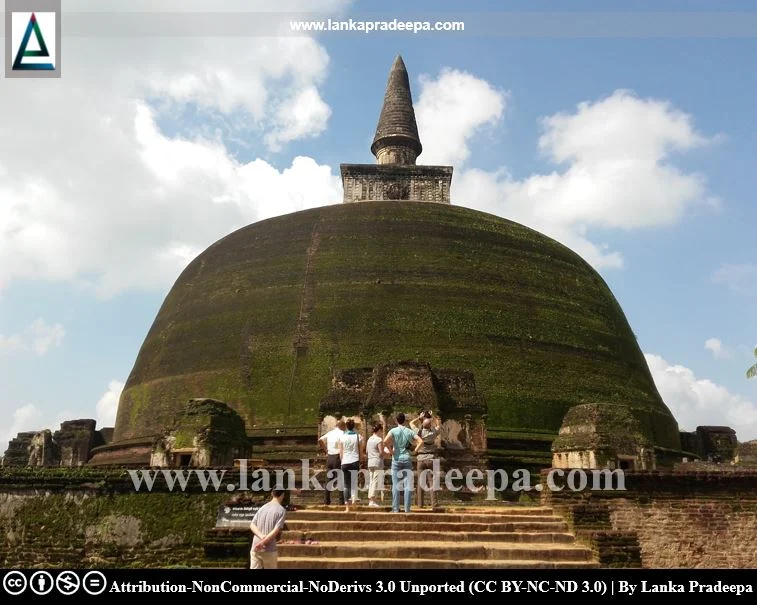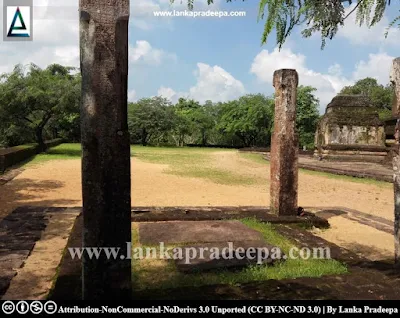
|
Rankoth Vehera Stupa |
Rankoth Vehera, also known as Rankoth Vihara, Ruwanweli Dagoba of Polonnaruwa (Sinhala: පොළොන්නරුව රන්කොත් වෙහෙර) is a colossal Stupa located in the Ancient City of Polonnaruwa, Sri Lanka. Built by King Nissankamalla (1187-1196 A.D.), it is the tallest Stupa found in this ancient city (Wikramagamage, 2004).
History
According to the account given in Pujavaliya, this Stupa is one of the edifices constructed by King Nissankamalla. The great chronicle Mahawamsa also states that Nissankamalla built the Ratnavali-cetiya (Ruwanweli in Sinhala) to a great height and adorned it with a golden pinnacle. An inscription by Nissankamalla in front of this Stupa claims that he is the builder of it (Jayasuriya, 2016; Nicholas, 1963).
In the Sinhalese language, the name Rankoth Vehera means gold-pinnacled Stupa (Wikramagamage, 2004). The word Ran (pronounce as run) means gold and Kotha means pinnacle while Vehera means either Stupa or temple. It is considered that this is the last mega Stupa built by a Sri Lankan king (Ranaweera, 2004).
The Stupa

The Rankoth Vehera Stupa and its monastery complex have been built between the Gopala Pabbatha (Southern boundary of Alahana Pirivena) and the Menik Vehera Complex. The Pabbata Vihara type monastery, which is located at the southern boundary of Rankoth Vehera Stupa was also a part of this 12th-century temple complex.
The Stupa is replete with four Ayakas (frontispieces), the stone terrace at the base, the square sand terrace, and the surrounding sand path. All these features follow the Anuradhapura Stupa type of the Ruwanveliseya. The construction method of the Stupa dome with a central solid brick cube is considered important. The upper part of the Stupa is supported by the solid brick cube and the space between the brick mantle dome and the solid brick cube is filled with brickbats and earth. The Stupas in Andra Pradesh in India are said to follow a similar device in dome construction but on a wheel design.
Presently, the Stupa has a base diameter of 56.7 m (dome diameter at the platform) and a height of 61 m [(height from the platform) Ranaweera, 2004]. The image houses those surrounding the Rankoth Vehera Stupa indicate the influence of the Mahasanghika sect (Wikramagamage, 2004).
Inscriptions
Rankoth Vehera Stupa is mentioned in the following inscriptions.
Sinhala Inscriptions
 Rankoth Dagoba Pillar Inscriptions
Rankoth Dagoba Pillar Inscriptions
Period: 12th-century A.D.
Reign: Nissankamalla (1187-1196 A.D.)
Script & Language: Medieval Sinhala
Transcript: ...Sri Vira Kalinga Lamkeshwara Aprati-Malla Nissmka Malla Parakrama-Bahu Cakravartti svamin - vahanse da venda vadara(na kuda)mayi
Translation: This is the pavilion, from which his majesty is pleased to warship the relics (enshrined in the Ruwanweli Dagoba)
Reign: Nissankamalla
Transcript: ...rajageta uturu-diga asu at Ruwanmeli dagob vahanse karava...
Translation: ... Ruwanweli Dagoba, eighty cubits on the north side of the royal residence...
Reign: Nissankamalla
Transcript: ...Ruvanweli dagoba karava vadarana kala karmmanta bala vadara vada hun mulu galin kala asanayayi
Translation: The seat, curved out of a single stone, which occupied (by his majesty) whilst watching the construction of the Ruwanweli dagoba
Reference: Wikramasinghe, 1928
Tamil Inscriptions
Rankot Vihara Velaikkaran inscription of Jayabahu IA Tamil inscription was found in a ruined building located between the north gate of the city and the Rankoth Vihara (Veluppillai, 1971).
Rankoth Vehera Velaikkaran Matevan Tamil InscriptionA Tamil pillar inscription was found on Rankoth Vihara temple premises during an archaeological survey conducted by the Cultural Triangle in 1981 (Pathmanathan, 2004). The inscription is engraved in 10 lines on each side of a square stone pillar (Pathmanathan, 2004). It contains no regnal year of any king but on paleographical considerations, the inscription is assigned to the early 13th century (Pathmanathan, 2004).
A Protected Monument
The Rankoth Vehera located in the Sri Nissankamallapura village in the Divisional Secretary’s Division, Thamankaduwa is an archaeological protected monument, declared by a government gazette notification published on 4 June 2004.


Related Posts
Read Also
References
Books, Government Gazette Notifications, Journal Articles
1) Jayasuriya, E., 2016. A guide to the Cultural Triangle of Sri Lanka. Central Cultural Fund. ISBN: 978-955-613-312-7. p.80.
2) Nicholas, C. W., 1963. Historical topography of ancient and medieval Ceylon. Journal of the Ceylon Branch of the Royal Asiatic
Society, New Series (Vol VI). Special Number: Colombo. Royal Asiatic
Society (Ceylon Branch). p.178.
3) Pathmanathan, S., 2004. New Light on the Decline of Polonnaruwa (1196-1215): The Tamil Pillar Inscription From Rankot Vihara. Proceedings of the Peradeniya University Research Sessions. Sri Lanka. Vol.9. November 10. 2004. p.31.
4) Ranaweera, M.P., 2004. Ancient stupas in Sri Lanka–Largest brick structures in the world. CHS Newsletter, 70. London. Construction History Society.
5) The Gazette of the Democratic Socialist Republic of Sri Lanka. No: 1344. 4 June 2004. p.15.
6) Veluppillai, A., 1971. Ceylon Tamil Inscriptions: Part 1. Published by the author. pp.24-26.
7) Wikramasinghe, D. M. D. Z., 1928. Epigraphia Zeylanica: Being lithic and other inscriptions of Ceylon Vol II: London. Published for the government of Ceylon by Humphrey Milford, pp. 98-123, 134-142.
8) Wikramagamage, C., 2004. Heritage of Rajarata: Major natural, cultural and historic sites: Colombo. Central Bank of Sri Lanka, p. 214.

